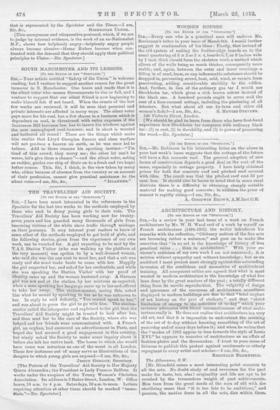ARCHITECTURE AND HISTORY.
[To THE EDITOR 01 TUE "SPECTATOR.° J SIR,—In a review in your last issue of a work on French architecture by Mr. W. H. Ward and of a work by myself on French architecture (1494-1661) the writer introduces his remarks with the reflection, "Obituary notices of the fine arts are becoming rather a nuisance," and goes on to make the assertion that "in no art is the knowledge of history of less practical value . . . than in architecture." With your re- viewer's criticism of my own work I am not concerned ; it is written without sympathy and without knowledge; but as an architect I must protest most strongly against this astounding inversion of the conditions and necessities of architectural training. All competent critics are agreed that -what is most wanted in modern architecture is the knowledge of what has been done by the great masters of the past ; a totally different thing from its servile reproduction. The vulgarity of design and ignorance of the resources of architecture sometimes displayed in modern buildings are due to that "total neglect of art history on the part of students " and that "strict limitation of energy to the activities of to-day" which your reviewer advocates with bland unconsciousness of what archie teeture really is. He does not realize that architecture is a very old art, and that it is impossible to understand the meaning of the art of to-day without knowing something of the art of yesterday and of many days before it; and when he writes that the "modes of 1912 appear to lean towards the style of Louis XVI." he appears to conceive of architecture as an affair of fashion-plates and the dressmaker. I trust to your sense of fairness to publish this protest against sentiments so utterly repugnant to every artist and scholar.--I am, Sir, &c., The Atheni'vum, S.W.
REGINALD BLOMFIELD.
[Mr. Blomfield raises a most interesting point common to all the arts. No doubt study of and reverence for the pint make for taste, but, alas ! originality and life are apt to be crushed by the tremendous weight of past achievements. Men turn from the great deeds of the men of old with the sterilizing sense that " it is too late to be ambitious," and passion, the motive force in all the arts, dies within them. Some great souls contrive to go through the valley of the shadow of the ancients and yet keep their freshness of mind, but they are few.—ED. Spectator.]







































 Previous page
Previous page